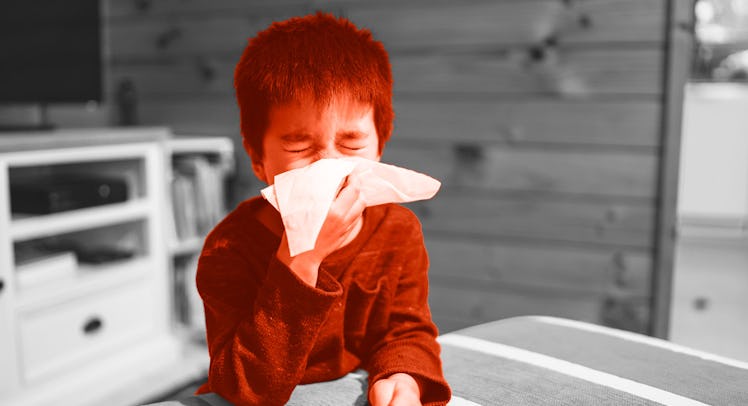How to Tell the Difference Between Allergies and a Cold
That cough and congestion may not be due to cold and flu at all, but allergies — a distinct problem with its own dangers.

Kids can get colds even in summer, which can make it hard to tell the difference between allergies and cold symptoms. That persistent cough and runny nose could be allergies … or it could be a cold. With kids especially, it’s easy to make a mistake when weighing cold vs. allergy symptoms, so it’s important that parents take a beat to check their assumptions.
“Allergy symptoms can include sneezing, runny nose, nasal congestion, itchy watery eyes, and itchy nose or throat. Some of these symptoms like congestion are also common with colds, so a lot of people have a hard time telling the difference between them,” says Dr. Neeta Ogden, a pediatric allergist, asthma specialist, and immunologist in New Jersey. “In fact, a recent survey found that nearly half of allergy sufferers, some 49 percent, find it difficult to differentiate allergies from a cold.”
One of the biggest ways to figure out the true culprit of sneezing and runny noses is duration — cold and flu symptoms only last 7 to 10 days. Allergies are a different story. “Allergies can wax and wane, go away and come back, or just persist,” cautions Ogden. “They can also be more prevalent at certain times of year — so if you find yourself sniffling and sneezing at the start of spring each year, it’s probably time to see an allergist for a proper diagnosis.”
The Difference Between Cold and Allergies
- Colds and flu end, but allergies come back again and again: Cold and flu symptoms run their course in about a week. Allergies can be seasonal or persistent, but will often be a chronic problem.
- Common triggers of seasonal allergies include pollen, ragweed, dust mites, mold, animal dander, and cockroaches.
- OTC is OK: There are numerous over-the-counter remedies specifically for kids, but parents should consult their pediatrician before starting any treatment.
- Allergies can be dangerous: Severe allergic asthma can make it very hard for a child to breathe. If a child is in distress, seek medical attention immediately.
Viral illnesses like the cold and flu don’t present exactly like allergies, either — symptoms like itchy eyes, nose, and ears are typically associated with allergies, not colds, whereas cold and flu symptoms, such as sore throats and fever, aren’t common with allergies. There may be some differences in nasal secretions as well, but it’s not necessarily a reliable diagnostic tool. The context of a runny nose helps parents determine if they are dealing with a virus or an allergy better than the color of the mucus. Question to ask include: How long has the child been sick? Do they have low energy, fever, or aches? Have they been exposed to any common allergy triggers? Common allergy triggers include pollen, ragweed, dust mites, mold, animal dander, and cockroaches.
The best help parents can offer their kids is to observe their symptoms and learn their allergy triggers. There are a number of over-the-counter allergy medications that are safe for kids, but parents should consult their pediatrician before starting any treatment; allergies are persistent and can be very dangerous.
“If your child has severe allergic asthma, they definitely can be dangerous and can make it very hard for a child to breathe. These are some of the most severe cases that deserve the attention of a board-certified allergist,” Ogden warns. “It’s important to understand the differences between allergies and colds, so kids can get the most appropriate treatment and find the relief they need.”
This article was originally published on